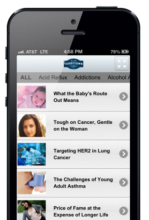
Editor’s note: Dan Munro writes for Forbes.com under the heading, “Healthcare Compass”)

Editor’s note: Dan Munro writes for Forbes.com under the heading, “Healthcare Compass”)
I’ve recounted the story behind this headline before (here) but there’s a longer, more detailed version – and lesson.
I attended a healthcare event last year that needs to remain nameless. It wasn’t a big event. In fact, it was very focused and relatively small. That’s about as much as we need to know because our headline came from that conference and the Chief Information Officer (CIO) who served it up wishes to remain anonymous. That’s ok, of course, but the story and lesson are definitely worth reviewing.
Mixed among the various panels that day was one with 5 CIO’s from various healthcare facilities – mostly hospitals. It was the last panel of the day and the topic was loosely around their collective view, vision and use of technology at their own facility. As is often the case, the reference to Return-On-Investment (ROI) came up at which point one of the CIO’s recounted this brief story from his own personal experience.
Turns out the Board of Directors at his hospital was considering a sizeable financial commitment to tablets – and specifically iPad’s. They asked the CFO for an ROI analysis – and the CFO turned the task over to this CIO. Using time-motion analysis around clinical workflow tied roughly to various labor costs – our CIO arrived at an interesting dilemma. In fairness, the study was far from scientific, but the ROI was so low – 9 days – that it ran the very real risk of being unbelievable to the Board. Still, that was what the data showed so that is what the CIO presented. The risk was limited by the simple fact that even if he was wrong – by even a huge margin of 100%, 200% or 300% or more – it still made for a relatively easy and compelling business decision.
The longer story is that the hospital continued with their roll-out of iPad’s hospital-wide. They have since successfully implemented their initial installation, and are embracing other mobile solutions rapidly. The technology lesson, however, is really much broader – and repeats in so many different ways.
The fact is, we have tons of effective technology to slay the healthcare beast. We’re swimming in it. The technology solutions themselves often put the revenue of big entrenched incumbents squarely at risk – so the solutions are often mired in the healthcare boneyard called ”pilot-itus.”
Clearly some of this is based on the way we think about new technology. The expectation – and dream – is deeply embedded in the DNA of the tech community. Technology, after all, has to be disruptive to be effective and worth pursuing. It “needs” to displace a heavily entrenched incumbent (think Kodak) with a (preferably cloud-based) digital alternative (think Instagram) and voila – you’re on your way to a spectacular event. The whole ecosystem heavily favors lean, rapid and iterative deployment. The more “disruptive” the better.
Everywhere, of course, except healthcare IT. It’s also one of the reasons we have over 400 Electronic Health Record (EHR) vendors – all plowing the exact same business solution. As Lewis Black would say – “How [expletive] dumb is that?”
Many of these EHR vendors – having gorged themselves on Federally issued “stimulus” checks (via the $26B HITECH Act) are now stuck in the trench-like warfare of “data-interoperability.” One easy prediction is that 400 EHR vendors will not survive. The disruption here won’t be the kind we’re used to seeing in all those captivating headlines or book titles.
Turns out that’s not entirely bad because EHR software isn’t the real disruption we need in healthcare anyway. It’s table stakes. No, the real lesson behind our 9-day iPad ROI analysis is this. The BIG technology disruption we’re all waiting for in healthcare isn’t innovation – it’s deployment. What we’re waiting for (sadly) is the alignment of profit incentives around new business models that simply leverage newer hardware and software solutions. Better health, safety and outcomes simply isn’t enough. The alternative headline here is the one I often quote: “The Achilles’ Heel of Digital Health is Reimbursement.” The biggest dilemma in healthcare IT ”innovation” isn’t technology – it’s who pays?
Here are some (often low tech) examples that highlight our dysfunctional thinking and resulting delayed deployment.
* We’ve (finally) calculated that paying people to wash their hands is cheaper than the hospital-acquired-infection that often results if they don’t (NYT here).
* A $200 air-conditioner is a low-tech solution for keeping an elderly cardiac patient comfortable at home – instead of the $40,000-$50,000 rescue event that is likely (and Medicare reimbursable) without the air-conditioner (Bloomberg here).
* A clinical trial of digital health on Medicaid patients (a preferred cohort over the worried well) is handicapped because low-income volunteers can’t afford the cellular data plan necessary for the trial (Forbes here).
* Back of the envelope math nets $6M in annual savings for privately held software vendor SAS by embracing primary healthcare (for decades) at the workplace (Forbes here).
There are dozens of these examples – which brings me back to the story of the CIO and his 9-day ROI analysis of iPads in a clinical setting. Of course it’s not surprising that the easy business case surfaced from inside the provider community. Those are the big expense centers around lots of centralized clinical workflow. About 30% of our entire National Healthcare Expenditure (over $3 trillion per year) is hospital related. Fortunately, the CIO saw the opportunity – seized it – and turned the culture around to support it. That included the software development necessary to support iOS and the iPad. That was definitely leadership but it also made “no brainer” business sense.
No, the real question behind all this – and the one I’m far more interested in? What’s the ROI of a basic smartphone (and data plan) in the hands of a chronically ill patient – and shouldn’t we know that? With all our focus on readmission (and the penalties ahead) what would it really cost to give a newly discharged patient a low-cost (even disposable) smartphone (and data plan) with a set of custom apps for direct communication and disease management? The ROI may not be 9 days – but like the iPad in a clinical setting or that $200 air-conditioner for the elderly cardiac patient – I’ll bet it’s an absolute no-brainer.
We’re swimming in an ocean of technology. We just need to find ways to change our thinking around profits and deployment. The real goal for a healthcare system is ultimately better health – right?








